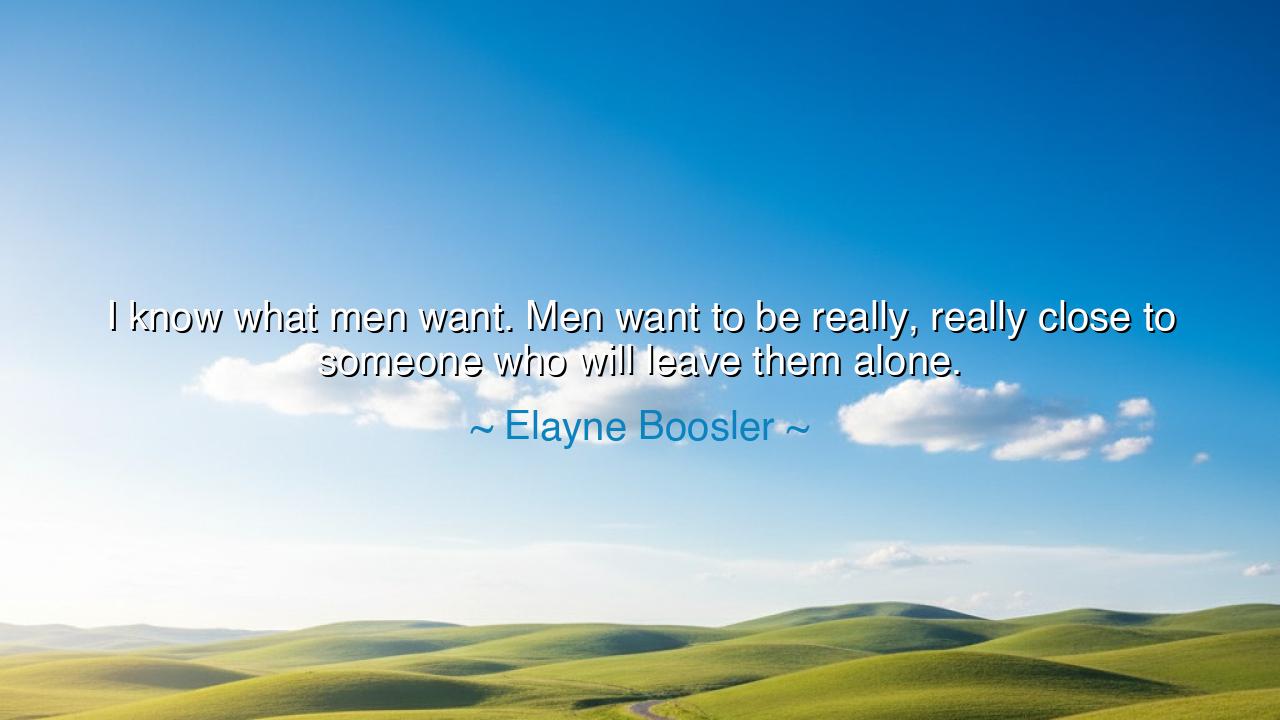
I know what men want. Men want to be really, really close to
I know what men want. Men want to be really, really close to someone who will leave them alone.






The words of Elayne Boosler — “I know what men want. Men want to be really, really close to someone who will leave them alone.” — may be spoken in jest, yet within their humor lies the wisdom of contradiction, the kind that reveals truth through laughter. Beneath the wit of this comedian’s observation rests a profound commentary on the human heart, on the eternal tension between the yearning for intimacy and the craving for freedom. It is a truth not of men alone, but of all who live: that the soul seeks closeness, yet fears the loss of itself in that closeness; that love, to be lasting, must embrace both connection and space.
Boosler, a pioneering female comedian of the late twentieth century, often hid sharp insight beneath the veil of comedy. Her humor was her sword, and her laughter her wisdom. In this quote, she captures the paradox at the center of all relationships — the delicate balance between togetherness and independence. To “be really, really close” is to feel safe, understood, and known. Yet to “be left alone” is to preserve one’s inner world, one’s sovereignty of spirit. When she speaks these words, she names the dance of intimacy, where two beings circle each other like stars — drawn by gravity, yet careful not to collide.
This paradox has echoed through history and myth alike. Consider the tale of Orpheus and Eurydice, the lovers bound by love yet divided by fate. Orpheus’s desire to hold his beloved close, even beyond death, led him to journey into the underworld. Yet his failure lay not in love, but in his inability to let go — to give space to mystery, to trust in what could not be seen. Love demands closeness, but it also demands respect for the unseen depths of the other’s being. The ancient Greeks knew this: that love without distance becomes possession, and freedom without connection becomes loneliness.
Boosler’s words, though wrapped in laughter, carry the same lesson. They remind us that love is not a merging of selves but a meeting of souls — each whole, each separate, each sacred. To “be left alone” does not mean neglect or indifference, but the granting of freedom, the acknowledgment that the other is not ours to own. The wisest companions know this truth instinctively. The friendship that endures, the marriage that matures, the partnership that thrives — all are built not on the constant presence of one soul upon another, but upon trust, respect, and space. The closeness we crave must breathe, or it will suffocate.
We see this balance in the life of Eleanor and Franklin Roosevelt. Their union was tested by distance, independence






AAdministratorAdministrator
Welcome, honored guests. Please leave a comment, we will respond soon